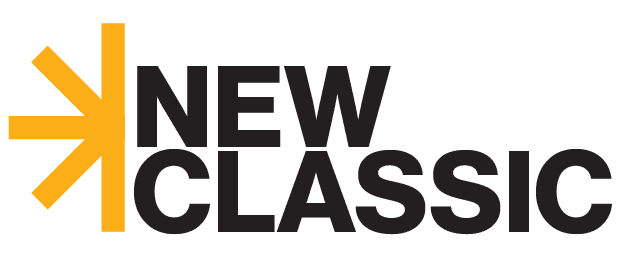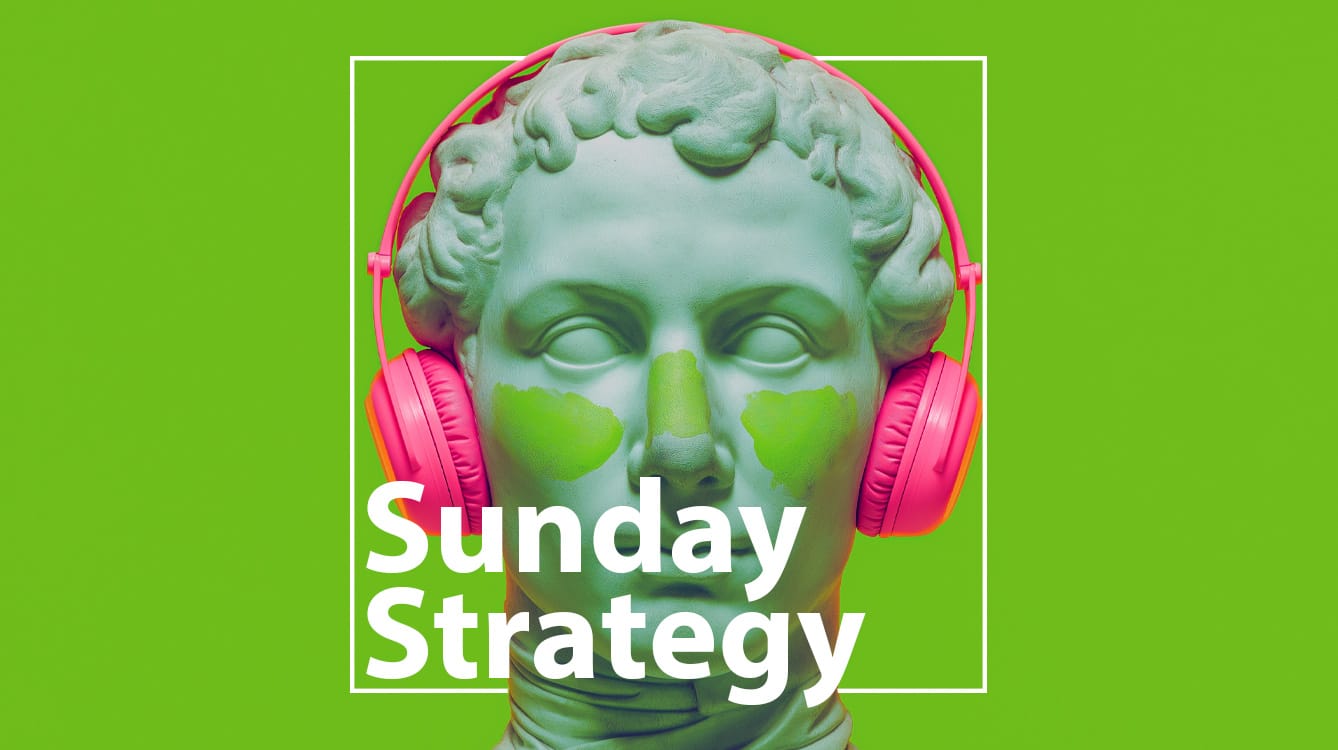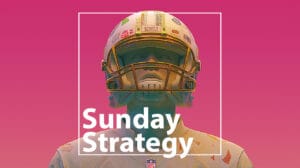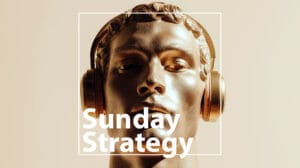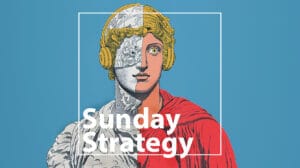In this issue of Sunday Strategy, we look at five stories to think about next week, including: the Self-Effacing Rebrand, a Chance for Challenger Airlines, Walmart’s Tariff Balancing Act and How We Feel About News.
In addition, we have ads from: Drogaria Sao Paolo, Mitchum, Gymshark and Luminor.
If you’d rather listen to this week’s episode, check out the podcast version below:
// Five Stories of the Week:
1.) The Self-Effacing Rebrand.
When everyone seems to celebrate a re-brand failing, what happens when the brand beats them to it? While KIND snacks lowkey launched their lowkey logo change recently, streaming service HBO MAX has gone all in with being the first to mock their change back to HBO MAX (after a dalliance as just MAX).
The stream of memes and meta analyses from the brand not only shows self awareness, it signals a need to de-risk branding. While the awareness of the move’s absurdity didn’t stop any decision making within the brand, it does show an understanding of how consumers see them vs. how they want to be seen. Pragmatism like this means the days of overly effusive rebrands may be giving way to self aware marketing pratfalls.
2.) How Fast Can a Challenger Airline Grow?
Challenger Airline brands can succeed; but for every Ryanair or JetBlue there are more that come and go quickly. However as budget airlines fragment, new lifestyle offerings arise and the line between charter, private and public airline blurs, is there an opportunity to rethink airline brands?
This week, Global Airlines, a virtual airline operating charter flights from various UK destinations to NYC took to the skies in its first flight – using one of four A380s the brand has access to. The sporadic routes and small fleet show its fledgling status against its vision to “bring back the good old days of air travel”, but can it find its stride? The pandemic showed the risk of large airline operating costs and models, but five years in, can someone do it differently?
3.) Walmart’s Tariff Balancing Act
Walmart’s announcement that it may raise prices in response to US tariffs has shown the political risks in business today. Walmart’s warning sparked the president to post that the brand should ‘EAT the Tariffs and keep prices down’, pushing the retailer to soften the blow of current US economic policy. With 90% of Americans reportedly Walmart customers, the brand’s price changes would serve as the biggest evidence of tariffs hitting consumer’s wallets and therefore even price changes are a political move.
The controversy also raises the question, can a brand stay apolitical in today’s cultural landscape? Previous YouGov data had shown that only 28 of nearly a thousand analyzed brands showed bipartisan preference and with economics and politics pulling brands like Walmart in different directions, it looks less likely in the future.
// Chart of the Week:
Emotions Americans Feel From News by Pew Research
Pew’s new ‘What is News’ feature shows how Americans decide what is news and how it makes them feel. Interestingly, news overwhelmingly informs but doesn’t empower those consuming it. The emotional cost of staying informed is real, as news is most likely to make Americans feel angry, sad and scared. While challenging times require greater understanding of the world around us, the negative impact of news may mean less Americans follow the issues affecting them.
// Ads You Might Have Missed:
1.) ‘24 Hour Bus Stop’ – Drogaria São Paulo:
Brazilian drugstore Drogaria São Paulo has launched an initiative that shows how marketing can be used in socially responsible ways. The brand has combined technology, data and urban presence to tackle the issue of nighttime violence at bus stops. Drogaria cross-referenced drugstore locations with urban violence data to decide where to implement 24 hour locations, giving greater presence and illumination to dangerous areas.
2.) ‘Gymshark Londrette’ – Gymshark:
Anyone who regularly works out or runs knows that fitness is as much a laundry game as it is an effort one. The hardest part is often finding clean workout kit when you’re frequently training, something that Gymshark thematically recognizes in their latest activation. The Gymshark Londrette was a branded pop up in London, coinciding with fitness competition Hyrox. Those who showed their Hyrox wrist band could get a free hoodie, customize clothing with event patches and even enjoy electrolyte powder in the form of detergent. The brand’s activity shows how a unique environment and perspective can give new value to event participants.
3.) ‘Southern Strength Deodorant’ – Mitcham:
As a brand, deodorant Mitcham is interesting – known of by many but seemingly without a compelling reason to choose them vs. a category filled with distinct brands from Old Spice to Dr. Squatch. While some would see this as a sign to depart from the dynamics of the category, Mitcham’s new campaign doubles down on its heritage and why it’s needed.
‘Southern Strength’ features shots of the American south done in a way where you can feel the heat behind it – evoking a humid August day in a way that cries out for deodorant. The sense of place that the brand evokes does heritage and need simultaneously and presents an intriguing question about the effectiveness of regionally rooted messaging.
4.) ‘Boooring’- Luminor:
Brands have a preference for the exciting, but Estonian bank Luminor’s latest campaign finds beauty in the boring. While finance brands would love to think customers see their brands as dynamic and exciting, most want something simple and convenient. Luminor leans into this, highlighting how their simple services and security can make interacting with them easier and prevent customers from having an ‘exciting’ fraud story. When it comes to who watches our money, boring wins over exciting most times – something Luminor taps into effectively.
// Sunday Snippets
// Marketing & Advertising //
// JBL tackles people returning their portable speakers after parties with a new ‘unreturnable’ 1000 pound speaker [Ads]
// Chime bank celebrates customer’s choices with NBA commentary [Ads]
// ASICs says dogs are the original fitness influencers in their latest ads [Ads]
// Hinge is publishing an anthology of users’ love stories [Ads]
// KFC UK releases a limited edition gravy gelato [Marketing]
// Milkbone uses Krypto, Superman’s dog, in their latest ad [Ads]
// Technology & Media //
// UK Banking app Monzo tackles erroneous transfers with a new ‘undo payment’ feature [Finance]
// OpenAI launches Codex, a cloud based software development agent [AI]
// How AI is changing the face of dating [AI]
// Inside the world of people still using Windows 95 [Tech]
// TikTok will show guided meditation to teens after 10pm [Social Media]
// Remote workers are more likely to be engaged, but also stressed [Work]
// Life & Culture //
//The rise of ‘Quiet Proposing’ [Culture]
// The increasing ‘Millennial Retirement Panic’ [Finance]
// Country Music is at war with itself [Music]
// A new study shows working too much can change your brain [Health]
// The ‘over at 10pm’ party continues as nightlife goes earlier [Culture]
// US staycation road trips are on the rise as economic uncertainty hits summer holiday season [Travel]
// European travellers are looking at ‘destination dupes’ to save money on holiday [Travel]
// Inside running culture in Europe [Culture]
// The growing political rift between ‘young’ and ‘old’ Gen Z [Culture]
// Alexis Ohanian has bought a 10% stake ($20m) in Chelsea’s women’s team [Sport]
// The New York Mets try a ‘Work from Home Plate’ style promotion to get afternoon attendance [Sport]
// Until Next Sunday
As always, let me know what you think by email (dubose@newclassic.agency), website or on LinkedIn.
You can also listen to an audio summary and discussion of each week’s newsletter on Spotify. We’re also on TikTok!
